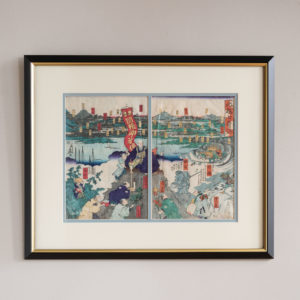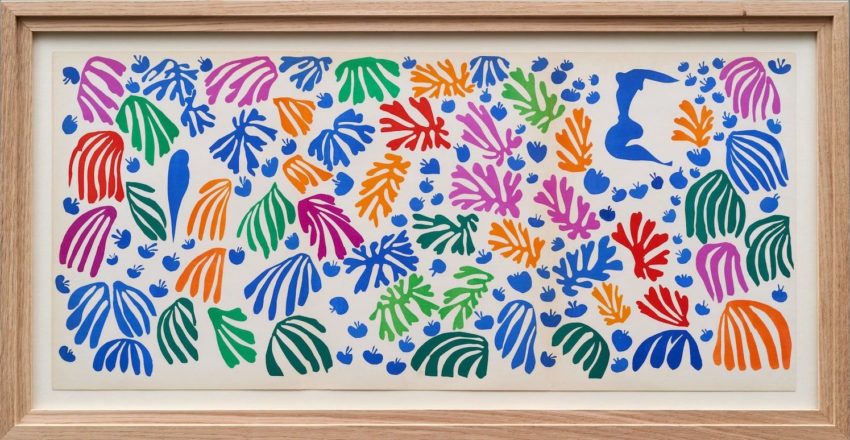
Art, Prints & Sculpture
Explore the full breadth of our decorative Works of Art. We have everything from numbered runs of prints and lithographs to original paintings and sketches. We specialise in London maps, including tube maps and plans of the City. Also lithographs by renowned Twentieth Century artists. You will find three dimensional sculpture in marble, bronze, plaster and more. Taxidermy and trophies are found alongside driftwood and weathervanes. Those in need of more functional pieces will discover shopkeepers and trade sign boards.
317 items found
Page 1 of 4
-
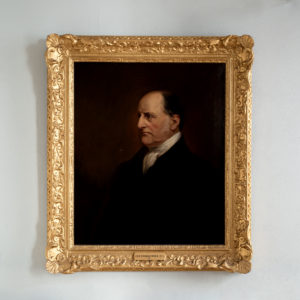
Portrait of Sir Francis Wood
£6,500Portrait of Sir Francis Wood
By H. Broughton, 1815 A oil on canvas head and shoulders portrait of Sir Francis Wood, Yorkshire landowner, London builder, Reformer, Abolitionist and Whig fixer. Set in a large ornate carved and gilded Maratta frame£6,500 -
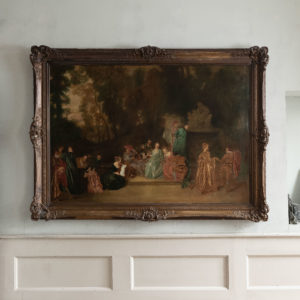
‘Merry Company’ or Récréation Galante
£5,980‘Merry Company’ or Récréation Galante
After Jean-Antoine Watteau Antoine (1664-1721) A full-size Mid 19th Century studio copy of the 18th Century genre picture entitled Récréation Galante by the French Roccoco painter Antoine Watteau. Set in a broad, faded-gilt composition french style frame with deep scoop sides, decorated all over in husk-and-guilloche with gadrooned and heavy applied corners of shell-and-foliage.£5,980 -
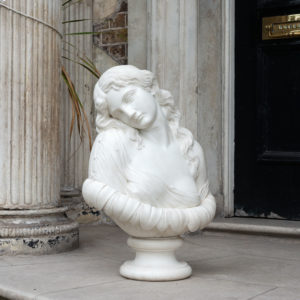
Nineteenth century statuary marble portrait bust of ‘Clytie’,
£4,500Nineteenth century statuary marble portrait bust of ‘Clytie’,
the female figure shown emerging from lotus leaves, on socle.£4,500 -
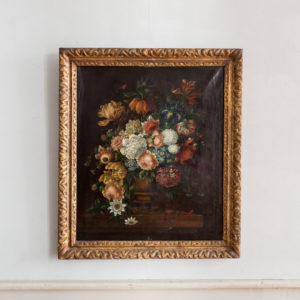
Continental School, floral still-life
£3,200Continental School, floral still-life
Continental still-life of a vase of flowers on a stone ledge. Gilt Frame. Old repairs and slight loss on paint.£3,200 -
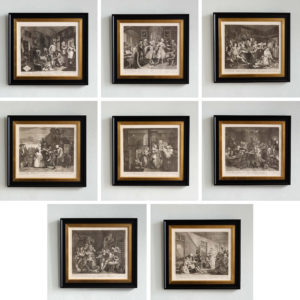
A Rake’s Progress after William Hogarth. A set of eight copper-engraved prints
£2,800 the set of eightA Rake’s Progress after William Hogarth. A set of eight copper-engraved prints
1803 Thomas Cook edition. Framed in black with a gold slip.£2,800 the set of eight -
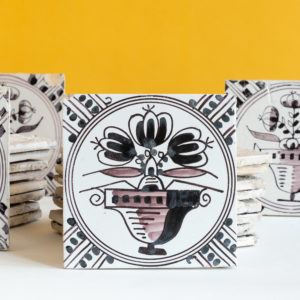
Fifty-four antique manganese Delft tiles, Dutch, Ninetieth century
£2,500 the setFifty-four antique manganese Delft tiles, Dutch, Ninetieth century
The square tiles all of similar thickness, all decorated with strikingly hand painted manganese fired design, depicting stylised open Dutch tulips in vases. The repeat pattern ideal for kitchen or bathroom splash backs, or to incorporate into fireplaces.£2,500 the set -
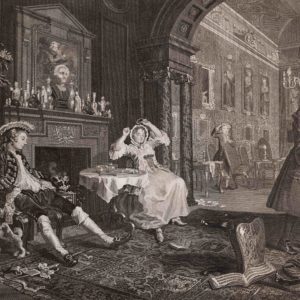
Marriage-a-la Mode, after William Hogarth. A set of six copper-engraved prints
£2,200 the set of sixMarriage-a-la Mode, after William Hogarth. A set of six copper-engraved prints
1803 Thomas Cook edition. Framed in black with a gold slip.£2,200 the set of six -
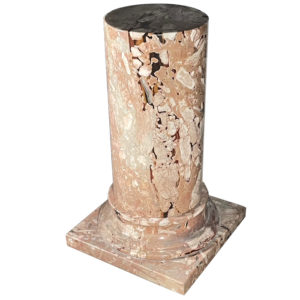
An English Marmo Rosa sculpture pedestal
£1,950An English Marmo Rosa sculpture pedestal
the cylindrical stem raised on a torus moulding and square plinth foot,£1,950 -
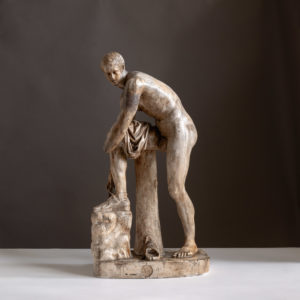
Plaster statue of Hermes fastening his sandle,
£1,850Plaster statue of Hermes fastening his sandle,
A French Mid-Nineteenth Century copy of the so called Sandal-binder Hermes. The Roman figure is held in the Musée du Louvre in Paris. The statue in the Louvre is a Roman marble copy of an original Greek Bronze by Lysippus. The appearance of the original, which stood in the Thermae of Zeuxippos in Constantinople, was described in detail by Christodoros of Koptos (491-518) : "There was Hermes ... He stood and fastened up the thongs of his winged sandal with his right hand, yearning to rush forth upon his course. His swift right leg was bent at the knee, and on it he rested his left hand, and meanwhile he was turning his face up to heaven, as if he were hearing the commands of his king and father" Three other complete copies of the Sandal-binder Hermes have been discovered or unearthed since Gavin Hamilton recovered the first complete antique figure from the swamp of the Pantello in 1749, thereby establishing it's identity firmly as Hermes and acknowledging it's status as one of the received masterpieces in the canon of antiquity. It appears to have been placed ornamentally in baths and gymnasia.£1,850 -
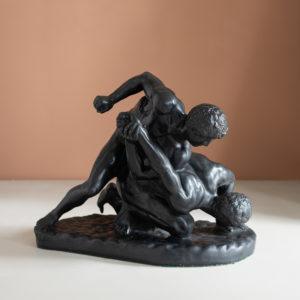
Nineteenth century bronzed plaster cast of ‘The Uffizi Wrestlers’,
£1,800Nineteenth century bronzed plaster cast of ‘The Uffizi Wrestlers’,
A Nineteenth century bronzed plaster sculptural copy of the Uffizi Wrestlers. Two young men are shown engaged in the pankration, a formed of Greek combat sport incorporating boxing, kickboxing and wrestling. The upper wrestler has his left leg entwined with his opponent's left leg, and his body across his opponent's body, twisting his opponent's right arm up£1,800 -
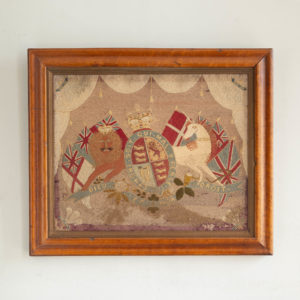
Victorian Embroidered Royal Coat of Arms
£1,500Victorian Embroidered Royal Coat of Arms
19th century embroidered Coat of Arms presented in a maple frame with gilt slip.£1,500 -
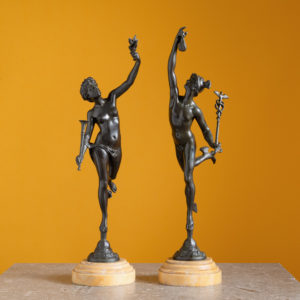
Pair of bronze statues Mercury and Fortuna,
£1,500 the pair -
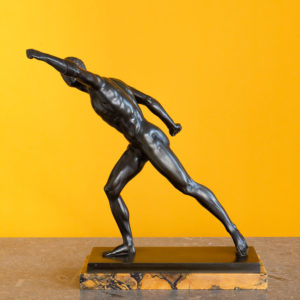
Nineteenth century bronze of the Borghese Gladiator
£1,500 -
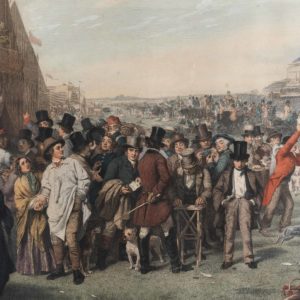
William Powell Frith ‘The Derby Day’
£1,450 -
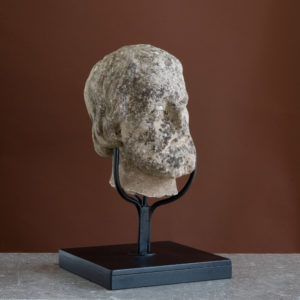
Weathered carved English Stone Head
£1,300Weathered carved English Stone Head
A worn and weatherbeaten sculpted stone head, possibly belonging to St Peter and likely Mid Ninteenth Century. Reputedly salvaged from the ruins of the 11th Century Church of St Mary and the Holy Rood at Little Chart in Kent. St Mary's Church was destroyed by a Flying Bomb on the 16th of August 1944 and later deconsecrated, with the parish reconstructed in neighbouring Great Chart£1,300 -
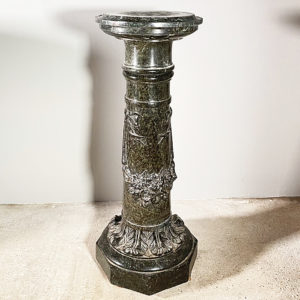
A Victorian carved serpentine marble sculpture pedestal
£1,250A Victorian carved serpentine marble sculpture pedestal
the dias top raised on a cylindrical stem carved with ribbon-tied swags and raised on a leafy socle and octagonal plinth foot,£1,250 -
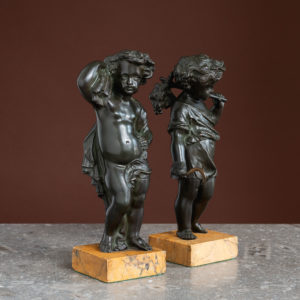
Pair of nineteenth century bronze figures of Harvest and Plenty,
£950 -
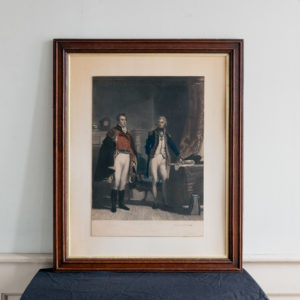
The Army and Navy Nelson & Wellington,
£850The Army and Navy Nelson & Wellington,
A hand coloured engraving By S.W. Reynolds after a painting by John Prescott Knight showing the only meeting between Arthur Wellesley Duke of Wellington and Admiral Lord Horatio Nelson, which took place in September, 1805 at the Colonial Office on Downing Street in London.£850 -
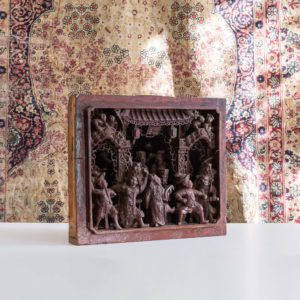
A nineteenth century carved diorama of a theatrical scene.
£850A nineteenth century carved diorama of a theatrical scene.
The carved red lacquered shaped box giving wonderful perspective of the fourteen characters on stage, a combination of dignitaries and warriors, ready to battle, the whole scene is overlooked by a dominating warrior, the proscenium arch flanked by lanterns and further figures. Some minor loses. Qing Dynasty (1636-1911)£850 -
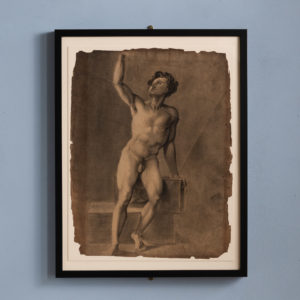
Early Nineteenth Century Nude Study,
£750Early Nineteenth Century Nude Study,
An early nineteenth century framed charcoal life-study of a male figure. The muscular figure is shown full length and front-on, contraposto, with arm upraised in a pose recollecting the Laocoon or Michaelangelo's Punishment of Tityus, now in the Royal Collecion.£750 -
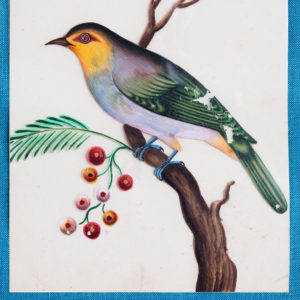
Set of Indian orthniological paintings on mica
£660 set of sixSet of Indian orthniological paintings on mica
Mica is a transparent mineral composed of complex mixtures of potassium silicates. The variety of mica used most frequently by these Indian artists is Muscovite (H2KAl3 Si04)3 which is found widely throughout south India. The mica is formed between strata of granite and the transparency of the material is a result of the heat and pressure created between the layers of rock during formation. Mica consists of many interlocking platelets, resulting in a laminar structure which can be split easily into thin sheets.£660 set of six -
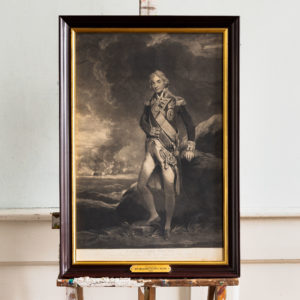
Admiral Lord Nelson at Copenhagen,
£650Admiral Lord Nelson at Copenhagen,
A framed mezzotint engraving of Admiral Lord Nelson at the battle of Copenhagen by Charles Turner, after John Hoppner. From the collection of Sir John Malcolm Fraser, 1st Baronet, journalist, Royal Naval captain, and vice-chairman of the Conservative Party.£650 -
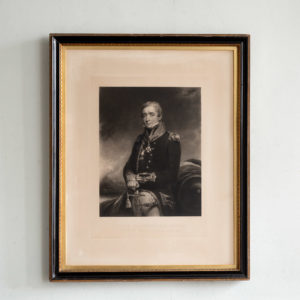
Captain Sir Christopher Cole,
£605Captain Sir Christopher Cole,
A framed portrait engraving by George H Phillips from the painting by William Owen R.A. showing the Naval Officer an statesman Captain Sir Christopher Cole.£605 -
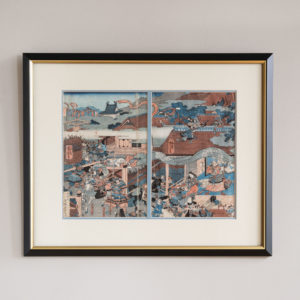
Japanese Woodblock Diptych.
£600 -
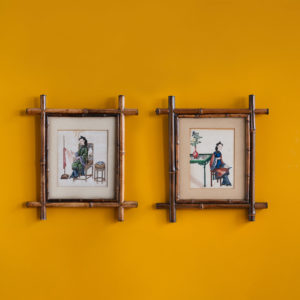
Pair of 19th Century Traditional Chinese Figure Paintings.
£600 the pairPair of 19th Century Traditional Chinese Figure Paintings.
Chinese pith paintings came into use for painting to satisfy the increasing demand for small, inexpensive and easily transported souvenirs, following the massive growth in the China Trade in the first quarter of the nineteenth century. Because of the nature of pith and its cellular structure, the gouache used by the Chinese sat on the surface and produced a bright and even sparkling effect.£600 the pair -
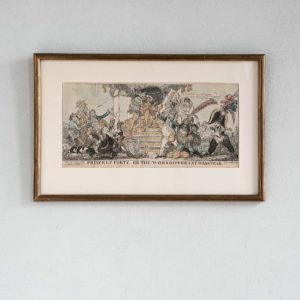
Princely Piety, or the worshippers at Wanstead,
£595Princely Piety, or the worshippers at Wanstead,
A hand-coloured etching by the caricaturist George Cruikshank depicting the wooing of a wealthy young heiress by a cast of reprobate suitors. Upon the death of her only brother James at the age of 11 in 1805 Catherine Tylney-Long became the richest commoner in England in her own right. At the tender of of 16 the 'Wiltshire Heiress' had come into a fortune of nearly £30,000,000 in today's money. This made the poor girl a prime target for every fortune hunter and indebted rake in England who wished to clear his creditors. The law as it stood in the early 19th Century had degenerated to such a degree that, under the principle of coverture, it denied a married woman any property at all in her own right while her legal existence as a feme covert was entirely subsumed in that of her husband. This left the wealthy orphan daughter of Sir James Tylney long, 7th Baronet in a difficult and precarious position, caught between the social stigma attached to unmarried womanhood and the appeals of a host of insinuating cads seeking her hand in marriage. Here Cruikshank depicts the many and assorted indigent suitors for the hand of the wealthy heiress. To the left of the dais are shown Lord Kilworth and William Wesley-Pole, later 4th Earl of Mornington a dissipated Anglo-Irish nobleman, who dueled over the courtship of Catherine. Kneeling at the foot of the steps we may also see the figure of Romeo Coates, unintentionally comic actor and 'improver' of Shakespeare included apparently 'not because of his pretensions, but his boasts and wishes'. Above him we see the fop and jobbing playwright, Sir Lumley Skeffington laying his poetic efforts at the feet of the heiress. On the right hand we see The Duke of Clarence, later William IV who by this point had debts of many hundreds of thousands of pounds holding back Baron-de-Geramb, a Spanish military adventurer and suspected Napoleonic spy who later became a Trappist monk where he used his position as procurator-general of that ancient order to defray his personal expenses. Above the Duke we see reproving the figure of Mrs Jordan, his 'common-law' wife with whom he had fathered many children at his retreat of Bushey Park. The farcical presentation of the situation belies it's tragic outcome. Perhaps cajoled by just such unkind insinuations as are repeated in this caricature Catherine would choose the worst-of-the-bunch, William Wesley-Pole, as her preferred suitor. William Wesley-Pole-Tylney-Long, as he became by Royal Licence in 1812, was an unredeemed rake and not only abused and impoverished his saintly young wife but also passed her a debilitating infection and caused her family seat at Wanstead House to be demolished and sold for salvage. After a short and unhappy marriage Catherine died at the age of only 35 after receiving a final brutal letter from her estranged husband, the contents of which apparently caused her to have some form of seizure. Frustrated in his efforts to gain custody of their son William, on whom the family fortune had devolved, William Pole Tylney-Long-Wellesley, 4th Earl of Mornington (the final name by which he was known) died in 1857 unwept, unhonoured and unsung if also unrepentant. His obituary in the Morning Star described him as "A spendthrift, a profligate, and a gambler in his youth, he became debauched in his manhood... redeemed by no single virtue, adorned by no single grace, his life gone out even without a flicker of repentance".£595 -
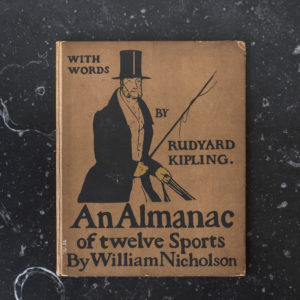
An Almanac of Twelve Sports by William Nicholson,
£550An Almanac of Twelve Sports by William Nicholson,
The Almanac was first published by Heinemann in London for Christmas 1897 with a calendar for the year 1898. Sir William Nicholson was a late 19th Century painter and print-maker. His experiments with woodcut printing encouraged the development of his distinctive pictorial style. After making his name with a series of twelve portraits of public figures (which won a gold medal at the 1900 Exposition Universelle in Paris) he moved on to produce this Almanac of twelve sports for his new publisher, Heinemann. The accompanying text was provided by the poet Rudyard Kipling. Kipling was not an enthusiastic sportsman, in fact he derided 'flannelled fools at the wicket' and 'muddied oafs at the goal' in his poem The Islanders however, after sitting for a Nicholson portrait, he agreed to provide a set of short poems to match the depicted sports. Kipling adopted a concise and suggestive style for the poems, harking back to his Departmental ditties of the 1880's. One verse at least, the draft couplet for the coaching party depicted in August, was considered too suggestive by half and was excised by Heinemann as unsuitable for the family audience he had in mind:'Youth on the box and liquor in the boot / My Lord drives out with my Lord's prostitute.'
£550 -
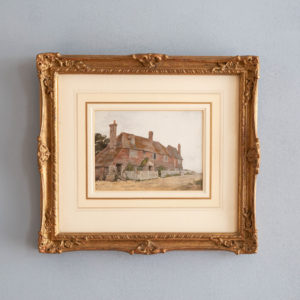
Cottages by Croydon born artist, George Edward Handel Lucas.
£450Cottages by Croydon born artist, George Edward Handel Lucas.
Original painting c1880 by George Edward Handel Lucas. Presented in a washline mount with a centre and corner gilt frame.£450 -
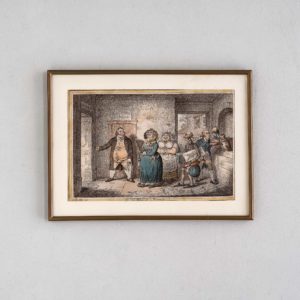
Old Maid on a Journey,
£450Old Maid on a Journey,
An original framed hand-coloured etching and engraving by caricaturist James Gillray. The corpulent figure of the independent polymath, antiquarian and collector Miss Sarah Sophia Banks is depicted being shown into the best bedroom of an Inn followed by a grotesque retinue of gurning servants carrying her assorted baggage. Miss Banks was a prolific collector of printed emphemera including broadsheets, newspaper clippings, visiting cards, caricatures, advertisements and playbills as well as being a leading numismatist of her day. Her great library of volumes on ancient coins as well as her capacious collection of the coins themselves was gifted to the nation upon her death and are now spread over the Royal Mint, The British Library and British Museum. One of the 18th Century's brilliant but unacknowledged women, Sarah Banks was the sister of the famous botanist Joseph Banks who sailed with Captain Cook to New South Wales. According to recent scholarship as well as editing her brother's manuscripts she often conversed with him on their subjects and many of her ideas were incorporated into his writings. Perhaps puzzlingly, given the warm and close friendship which was said to exist between Gillray and his wealthy female patron, Miss Banks is depicted as a obscenely fat and ugly. One can only speculate on the nature of the comedy and manners of the time (not to mention the sense of humour of the subject) when interpreting the comic effect of this print.£450 -
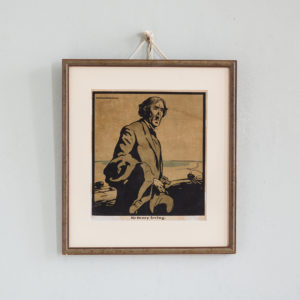
Sir Henry Irving
£450 -
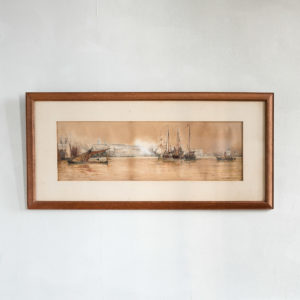
The Customs House by Thomas Bush Hardy
£450The Customs House by Thomas Bush Hardy
Showing the Pool of London with the Customs House. Signed, framed in dark wood.£450 -
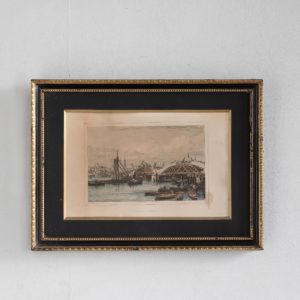
The Works of New London Bridge by Edward William Cooke RA,
£450The Works of New London Bridge by Edward William Cooke RA,
A hand-coloured engraving by George Cooke of a drawing by his son Edward William Cooke RA, from 'The Works of New London Bridge'. In 1800 it was first proposed that the inconvenient medieval bulk of old London bridge should be removed to ease traffic on the Thames and a competition was held to design a replacement. In 1824, the plans of the engineer Sir John Rennie were accepted and a site was chosen 180 feet west of the old bridge. On June 15, 1825, the Lord Mayor of London, John Garratt, laid the first block of Dartmoor granite in the presence of the Duke of York. For a short time Londoners were able to view both the old bridge and the new side-by-side. It was to be a structure of 5 arches, over 928 feet long and 49 feet wide. When the new bridge was finished and opened by King William and Queen Adelaide in 1831, traffic switched to the huge new structure and the demolition commenced on the old bridge. Edward William Cooke (1811 - 1880) was a draughtsman, illustrator, wood engraver, etcher and painter of rural and coastal scenes in oil and watercolour. In this print Cooke shows new London bridge in the middle stages of construction with the forms for the arches still in place. On the far bank of the Thames the viewer can see the Fishmongers Hall, the steeple of St Magnus the Matryr church and The Monument.£450 -
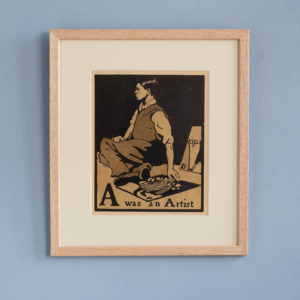
An Alphabet by William Nicholson, A was an Artist,
£400 eachAn Alphabet by William Nicholson, A was an Artist,
Nicholson was recommended by his friend, James McNeil Whistler to the publishers Heinemann as an original and expert wood-cut artist. The relationship with the publisher was highly successful, establishing Nicholson’s reputation as an illustrator. Between 1897 and 1900 he illustrated five works: An Alphabet, An Almanac of Twelve Sports, Twelve Portraits, London Types, and The Square Book of Animals.£400 each -
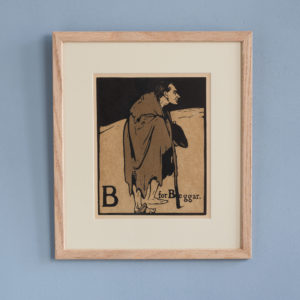
An Alphabet by William Nicholson, B for Beggar,
£400 eachAn Alphabet by William Nicholson, B for Beggar,
Nicholson was recommended by his friend, James McNeil Whistler to the publishers Heinemann as an original and expert wood-cut artist. The relationship with the publisher was highly successful, establishing Nicholson’s reputation as an illustrator. Between 1897 and 1900 he illustrated five works: An Alphabet, An Almanac of Twelve Sports, Twelve Portraits, London Types, and The Square Book of Animals.£400 each -
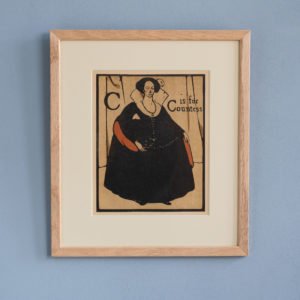
An Alphabet by William Nicholson, C is for Countess,
£400 eachAn Alphabet by William Nicholson, C is for Countess,
Nicholson was recommended by his friend, James McNeil Whistler to the publishers Heinemann as an original and expert wood-cut artist. The relationship with the publisher was highly successful, establishing Nicholson’s reputation as an illustrator. Between 1897 and 1900 he illustrated five works: An Alphabet, An Almanac of Twelve Sports, Twelve Portraits, London Types, and The Square Book of Animals.£400 each -
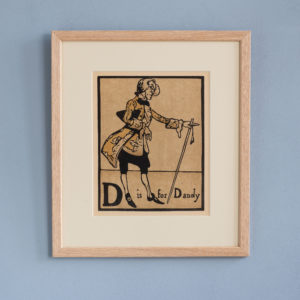
An Alphabet by William Nicholson, D is for Dandy,
£400 eachAn Alphabet by William Nicholson, D is for Dandy,
Nicholson was recommended by his friend, James McNeil Whistler to the publishers Heinemann as an original and expert wood-cut artist. The relationship with the publisher was highly successful, establishing Nicholson’s reputation as an illustrator. Between 1897 and 1900 he illustrated five works: An Alphabet, An Almanac of Twelve Sports, Twelve Portraits, London Types, and The Square Book of Animals.£400 each -
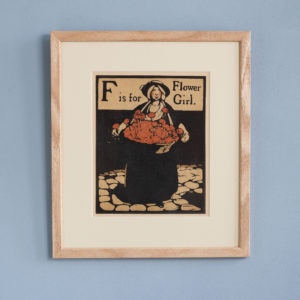
An Alphabet by William Nicholson, F is for Flower Girl,
£400 eachAn Alphabet by William Nicholson, F is for Flower Girl,
Nicholson was recommended by his friend, James McNeil Whistler to the publishers Heinemann as an original and expert wood-cut artist. The relationship with the publisher was highly successful, establishing Nicholson’s reputation as an illustrator. Between 1897 and 1900 he illustrated five works: An Alphabet, An Almanac of Twelve Sports, Twelve Portraits, London Types, and The Square Book of Animals.£400 each -
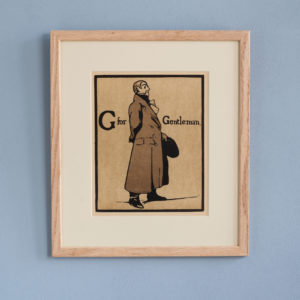
An Alphabet by William Nicholson, G for Gentleman,
£400 eachAn Alphabet by William Nicholson, G for Gentleman,
Nicholson was recommended by his friend, James McNeil Whistler to the publishers Heinemann as an original and expert wood-cut artist. The relationship with the publisher was highly successful, establishing Nicholson’s reputation as an illustrator. Between 1897 and 1900 he illustrated five works: An Alphabet, An Almanac of Twelve Sports, Twelve Portraits, London Types, and The Square Book of Animals.£400 each -
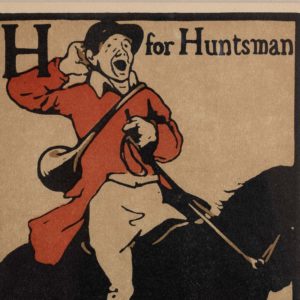
An Alphabet by William Nicholson, H for Huntsman,
£400 eachAn Alphabet by William Nicholson, H for Huntsman,
Nicholson was recommended by his friend, James McNeil Whistler to the publishers Heinemann as an original and expert wood-cut artist. The relationship with the publisher was highly successful, establishing Nicholson’s reputation as an illustrator. Between 1897 and 1900 he illustrated five works: An Alphabet, An Almanac of Twelve Sports, Twelve Portraits, London Types, and The Square Book of Animals.£400 each -
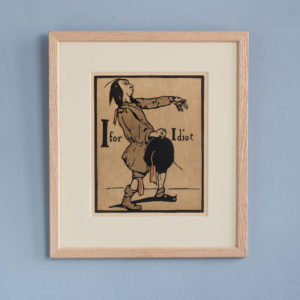
An Alphabet by William Nicholson, I for Idiot,
£400 eachAn Alphabet by William Nicholson, I for Idiot,
Nicholson was recommended by his friend, James McNeil Whistler to the publishers Heinemann as an original and expert wood-cut artist. The relationship with the publisher was highly successful, establishing Nicholson’s reputation as an illustrator. Between 1897 and 1900 he illustrated five works: An Alphabet, An Almanac of Twelve Sports, Twelve Portraits, London Types, and The Square Book of Animals.£400 each -
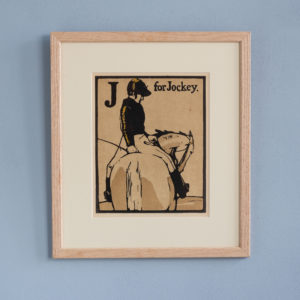
An Alphabet by William Nicholson, J for Jockey,
£400 eachAn Alphabet by William Nicholson, J for Jockey,
Nicholson was recommended by his friend, James McNeil Whistler to the publishers Heinemann as an original and expert wood-cut artist. The relationship with the publisher was highly successful, establishing Nicholson’s reputation as an illustrator. Between 1897 and 1900 he illustrated five works: An Alphabet, An Almanac of Twelve Sports, Twelve Portraits, London Types, and The Square Book of Animals.£400 each -
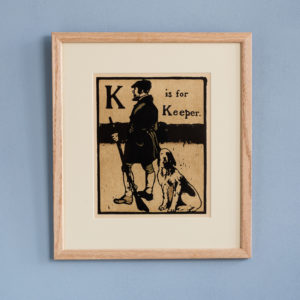
An Alphabet by William Nicholson, K is for Keeper,
£400 eachAn Alphabet by William Nicholson, K is for Keeper,
Nicholson was recommended by his friend, James McNeil Whistler to the publishers Heinemann as an original and expert wood-cut artist. The relationship with the publisher was highly successful, establishing Nicholson’s reputation as an illustrator. Between 1897 and 1900 he illustrated five works: An Alphabet, An Almanac of Twelve Sports, Twelve Portraits, London Types, and The Square Book of Animals.£400 each -
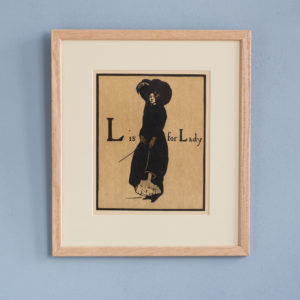
An Alphabet by William Nicholson, L is for Lady,
£400 eachAn Alphabet by William Nicholson, L is for Lady,
Nicholson was recommended by his friend, James McNeil Whistler to the publishers Heinemann as an original and expert wood-cut artist. The relationship with the publisher was highly successful, establishing Nicholson’s reputation as an illustrator. Between 1897 and 1900 he illustrated five works: An Alphabet, An Almanac of Twelve Sports, Twelve Portraits, London Types, and The Square Book of Animals.£400 each -
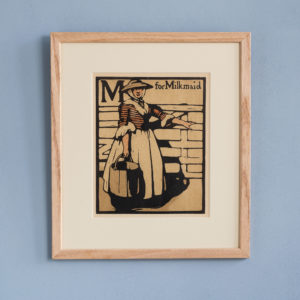
An Alphabet by William Nicholson, M for Milkmaid,
£400 eachAn Alphabet by William Nicholson, M for Milkmaid,
Nicholson was recommended by his friend, James McNeil Whistler to the publishers Heinemann as an original and expert wood-cut artist. The relationship with the publisher was highly successful, establishing Nicholson’s reputation as an illustrator. Between 1897 and 1900 he illustrated five works: An Alphabet, An Almanac of Twelve Sports, Twelve Portraits, London Types, and The Square Book of Animals.£400 each -
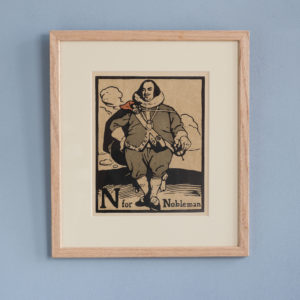
An Alphabet by William Nicholson, N for Nobleman,
£400 eachAn Alphabet by William Nicholson, N for Nobleman,
Nicholson was recommended by his friend, James McNeil Whistler to the publishers Heinemann as an original and expert wood-cut artist. The relationship with the publisher was highly successful, establishing Nicholson’s reputation as an illustrator. Between 1897 and 1900 he illustrated five works: An Alphabet, An Almanac of Twelve Sports, Twelve Portraits, London Types, and The Square Book of Animals.£400 each -
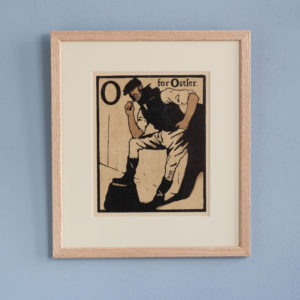
An Alphabet by William Nicholson, O for Ostler,
£400 eachAn Alphabet by William Nicholson, O for Ostler,
Nicholson was recommended by his friend, James McNeil Whistler to the publishers Heinemann as an original and expert wood-cut artist. The relationship with the publisher was highly successful, establishing Nicholson’s reputation as an illustrator. Between 1897 and 1900 he illustrated five works: An Alphabet, An Almanac of Twelve Sports, Twelve Portraits, London Types, and The Square Book of Animals.£400 each -
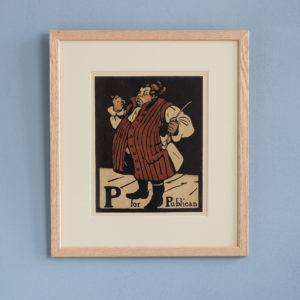
An Alphabet by William Nicholson, P for Publican,
£400 eachAn Alphabet by William Nicholson, P for Publican,
Nicholson was recommended by his friend, James McNeil Whistler to the publishers Heinemann as an original and expert wood-cut artist. The relationship with the publisher was highly successful, establishing Nicholson’s reputation as an illustrator. Between 1897 and 1900 he illustrated five works: An Alphabet, An Almanac of Twelve Sports, Twelve Portraits, London Types, and The Square Book of Animals.£400 each -
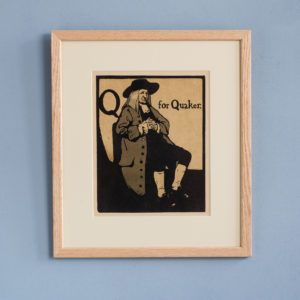
An Alphabet by William Nicholson, Q for Quaker,
£400 eachAn Alphabet by William Nicholson, Q for Quaker,
Nicholson was recommended by his friend, James McNeil Whistler to the publishers Heinemann as an original and expert wood-cut artist. The relationship with the publisher was highly successful, establishing Nicholson’s reputation as an illustrator. Between 1897 and 1900 he illustrated five works: An Alphabet, An Almanac of Twelve Sports, Twelve Portraits, London Types, and The Square Book of Animals.£400 each -
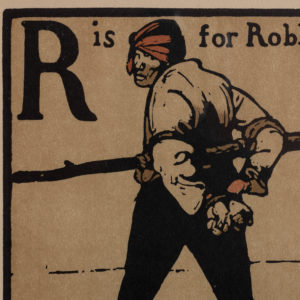
An Alphabet by William Nicholson, R is for Robber,
£400 eachAn Alphabet by William Nicholson, R is for Robber,
Nicholson was recommended by his friend, James McNeil Whistler to the publishers Heinemann as an original and expert wood-cut artist. The relationship with the publisher was highly successful, establishing Nicholson’s reputation as an illustrator. Between 1897 and 1900 he illustrated five works: An Alphabet, An Almanac of Twelve Sports, Twelve Portraits, London Types, and The Square Book of Animals.£400 each -

An Alphabet by William Nicholson, S for Sportsman,
£400 eachAn Alphabet by William Nicholson, S for Sportsman,
Nicholson was recommended by his friend, James McNeil Whistler to the publishers Heinemann as an original and expert wood-cut artist. The relationship with the publisher was highly successful, establishing Nicholson’s reputation as an illustrator. Between 1897 and 1900 he illustrated five works: An Alphabet, An Almanac of Twelve Sports, Twelve Portraits, London Types, and The Square Book of Animals.£400 each -
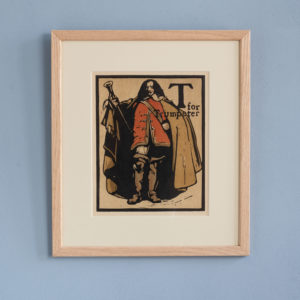
An Alphabet by William Nicholson, T for Trumpeter,
£400 eachAn Alphabet by William Nicholson, T for Trumpeter,
Nicholson was recommended by his friend, James McNeil Whistler to the publishers Heinemann as an original and expert wood-cut artist. The relationship with the publisher was highly successful, establishing Nicholson’s reputation as an illustrator. Between 1897 and 1900 he illustrated five works: An Alphabet, An Almanac of Twelve Sports, Twelve Portraits, London Types, and The Square Book of Animals.£400 each -
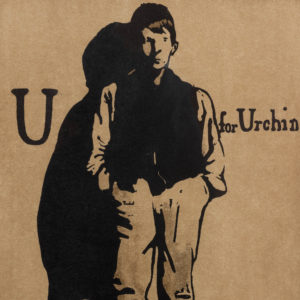
An Alphabet by William Nicholson, U for Urchin,
£400 eachAn Alphabet by William Nicholson, U for Urchin,
Nicholson was recommended by his friend, James McNeil Whistler to the publishers Heinemann as an original and expert wood-cut artist. The relationship with the publisher was highly successful, establishing Nicholson’s reputation as an illustrator. Between 1897 and 1900 he illustrated five works: An Alphabet, An Almanac of Twelve Sports, Twelve Portraits, London Types, and The Square Book of Animals.£400 each -
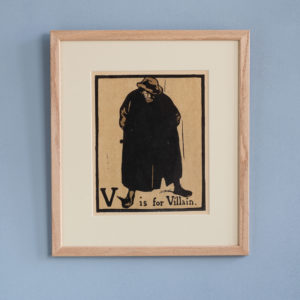
An Alphabet by William Nicholson, V is for Villain,
£400 eachAn Alphabet by William Nicholson, V is for Villain,
Nicholson was recommended by his friend, James McNeil Whistler to the publishers Heinemann as an original and expert wood-cut artist. The relationship with the publisher was highly successful, establishing Nicholson’s reputation as an illustrator. Between 1897 and 1900 he illustrated five works: An Alphabet, An Almanac of Twelve Sports, Twelve Portraits, London Types, and The Square Book of Animals.£400 each -
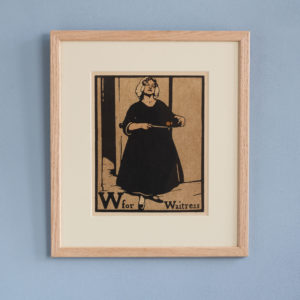
An Alphabet by William Nicholson, W for Waitress,
£400 eachAn Alphabet by William Nicholson, W for Waitress,
Nicholson was recommended by his friend, James McNeil Whistler to the publishers Heinemann as an original and expert wood-cut artist. The relationship with the publisher was highly successful, establishing Nicholson’s reputation as an illustrator. Between 1897 and 1900 he illustrated five works: An Alphabet, An Almanac of Twelve Sports, Twelve Portraits, London Types, and The Square Book of Animals.£400 each -
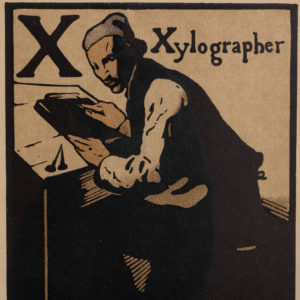
An Alphabet by William Nicholson, X Xylographer,
£400 eachAn Alphabet by William Nicholson, X Xylographer,
Nicholson was recommended by his friend, James McNeil Whistler to the publishers Heinemann as an original and expert wood-cut artist. The relationship with the publisher was highly successful, establishing Nicholson’s reputation as an illustrator. Between 1897 and 1900 he illustrated five works: An Alphabet, An Almanac of Twelve Sports, Twelve Portraits, London Types, and The Square Book of Animals.£400 each -
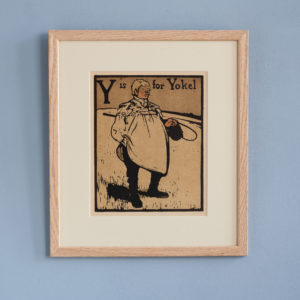
An Alphabet by William Nicholson, Y is for Yokel,
£400 eachAn Alphabet by William Nicholson, Y is for Yokel,
Nicholson was recommended by his friend, James McNeil Whistler to the publishers Heinemann as an original and expert wood-cut artist. The relationship with the publisher was highly successful, establishing Nicholson’s reputation as an illustrator. Between 1897 and 1900 he illustrated five works: An Alphabet, An Almanac of Twelve Sports, Twelve Portraits, London Types, and The Square Book of Animals.£400 each -
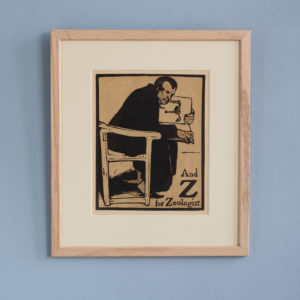
An Alphabet by William Nicholson, And Z for Zoologist,
£400 eachAn Alphabet by William Nicholson, And Z for Zoologist,
Nicholson was recommended by his friend, James McNeil Whistler to the publishers Heinemann as an original and expert wood-cut artist. The relationship with the publisher was highly successful, establishing Nicholson’s reputation as an illustrator. Between 1897 and 1900 he illustrated five works: An Alphabet, An Almanac of Twelve Sports, Twelve Portraits, London Types, and The Square Book of Animals.£400 each -
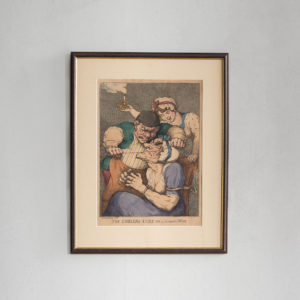
The Cobbler’s Cure for a Scolding Wife
£395The Cobbler’s Cure for a Scolding Wife
A framed, hand-colored etching by Thomas Rowlandson, published by Thomas Tegg. A study in human savagery. A cobbler stands over his wife, a grimacing virago who is tied to a chair with her wrists bound. With his awl between his teeth he pulls at the thread with which he is stitching up her mouth. A buxom young woman leans delightedly over the pair, lighting the work with a small candle. Rowlandson was a chronicler of London life both low and high. Less inclined to political comment than his contemporaries Gilray and Cruikshank he chose instead to focus of the foibles, fancies and failings of common society. His drawings were always harsh and frequently grotesque, even repulsive. The figures in his work are rarely, if ever, held up for our admiration but rather in accordance with his maxim of 1802 that "Man is the only creature endowed with the power of laughter, is he not also the only one that deserves to be laughed at?" Rowlandson's designs were usually executed in outline with the reed-pen, and delicately washed with colour. They were then etched by the artist on the copper, and afterwards aqua-tinted usually by a professional engraver, the impressions being finally coloured by hand.£395 -
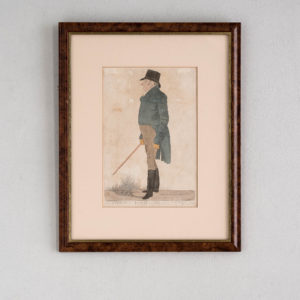
A View from the Old South Sea House
£370A View from the Old South Sea House
A hand-coloured etching by the Regency satirist Richard Dighton showing the brewer James Curtis. Richard Dighton was the son and apprentice of another noted caricaturist Robert Dighton and brother of the battle-scene painter Denis Dighton. The works of Robert and Richard Dighton are regarded as predecessors of the Vanity Fair style of the late nineteenth century. The series of portraits of City and West End characters to which this etching belongs was started in 1817 and Dighton would go on to publish a number of etchings during the next decade before retiring early to Cheltenham. This edition, of 1824, was printed by Thomas McLean Printseller & Publisher at 26 Haymarket, on the eastern side just north of Panton Street. The subject of the print, James Curtis, was a prominent and prosperous London brewer of the early 19th Century and his portrait, painted by Thomas Lawrence, now hangs in the Manchester Art Gallery. The Old South Sea House mentioned was located on the Threadneedle Street corner of Bishopsgate. The back of it apparently burned down in 1826 and was subsequently rebuilt. The building was the headquarters of the South Sea Company. Incorporated in 1711, the company was assigned a monopoly on British trade with Spanish America but, when that failed, it embarked upon a speculative scheme that ended in the economic collapse known as the ‘South Sea Bubble’ which saw many investors ruined. The building was partly remodeled in the 1850s and was eventually demolished at the end of the 19th century£370 -
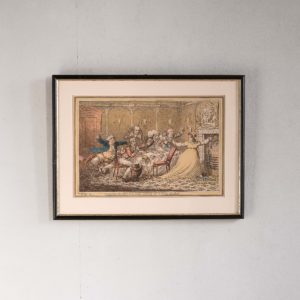
Company shocked at a lady getting up to ring the bell,
£360Company shocked at a lady getting up to ring the bell,
A hand-coloured satirical etching by James Gillray, Published by Hannah Humphrey. Five men are depicted courting a wealthy widow in her luxuriously furnished breakfast parlour over boiled eggs bread and muffins. The widow has risen from her chair to pull a bell-pull while frantic efforts of the suitors to stop her have produced a sequence of disasters. Published by Gillray's long-time and eventual exclusive publisher, Hannah Humphrey. Mrs Humphrey was the sister of engraver William Humphrey and became not only an independent businesswoman in Georgian London but London's leading seller of caricature prints. She began publishing prints in the 1770s at a premises on St Martin’s Lane before moving, first to Old Bond Street, then New Bond Street before finally settling at 27 St James’s Street. James Gillray lodged with Mrs Humphrey for twenty tears from 1791 and although some suspected an illicit relationship it was in all probability a commercial and platonic friendship. Mrs Humphrey cared for Gillray as his sight failed him and later tended to him during the alcohol induced madness of his last five years of life.£360 -
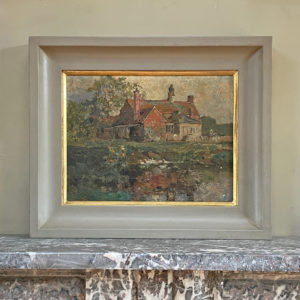
A rural scene oil on panel,
£350A rural scene oil on panel,
the depiction of a cottage, with pond in the foreground, the painting surface crackled, presented in a newly made parcel gilt, waxed and painted pine frame,£350 -
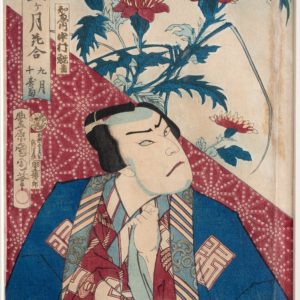
“Twelve Months of Flowers September Senju Chrysanthemum “Chienai Nakamura Suzaku”by Toyohara Kunichika
£350 -
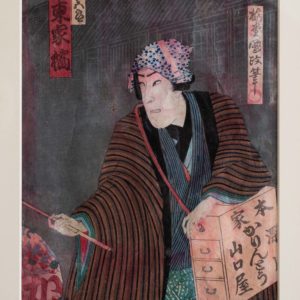
Bandō Kakitsu I, an actor by Baido Kunimasa
£350Bandō Kakitsu I, an actor by Baido Kunimasa
R/H section of a triptych depicting the actor Bandō Kakitsu I playing a karinto merchant in the play Chitose-za shin kyogen Tsuki shiraha bonji horimono.£350 -
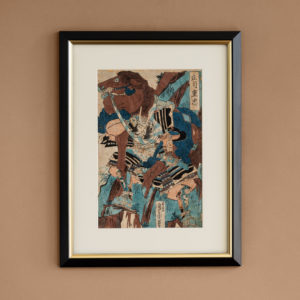
Samurai Warlord, Hatakeyama Shigetada by Utagawa Kunimune
£350Samurai Warlord, Hatakeyama Shigetada by Utagawa Kunimune
Hatakeyama Shigetada, was a warrior of the early Kamakura Period (1185-1333) famed for his virtue and bravery.£350 -
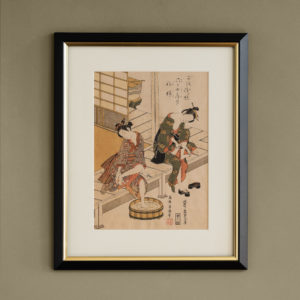
Pedicure by Torii Kiyohiro
£350Pedicure by Torii Kiyohiro
Produced by of the leading artists of the era of two-colour 'benizurie' prints, where the works are printed in pink (beni) and green, a style that peaked in the early 1740s.£350 -
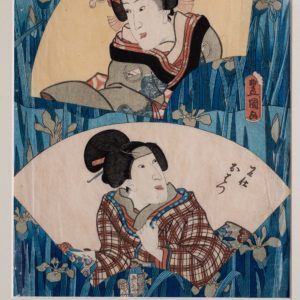
Yaoya oshichi meshitsukai o Hatsu by Utagawa Kunisada
£350Yaoya oshichi meshitsukai o Hatsu by Utagawa Kunisada
Yaoya Oshichi was a daughter of the greengrocer Tarobei, who lived in the Hongō neighborhood of Edo at the beginning of the Edo period. She was burned at the stake for attempting to commit arson. The story became the subject of joruri puppet plays.£350 -
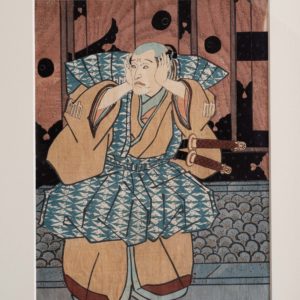
An actor from Chushingura by Utagawa Kunisada
£350An actor from Chushingura by Utagawa Kunisada
Chushingura, was Japan’s most popular kabuki play, with its origins in an event of organized mob violence in 1702, its a complex story of unquestioning loyalty, revenge, conflict, love, and punishment.£350 -
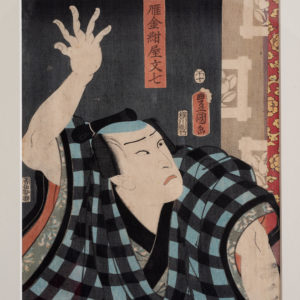
Kataoka Nizaemon VIII as Karigane Kon’ya Bunshichi by Utagawa Kunisada I (Toyokuni III)
£350Kataoka Nizaemon VIII as Karigane Kon’ya Bunshichi by Utagawa Kunisada I (Toyokuni III)
This print originally formed the R/H side from a triptych of the play, Eiyû Koko ni Yorimasa£350 -
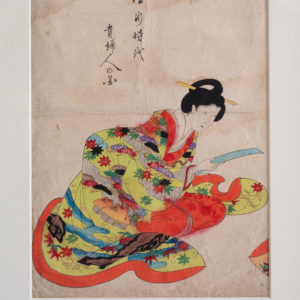
A girl reading poetry by Toyohara Chikanobu
£350A girl reading poetry by Toyohara Chikanobu
This print originally formed the R/H side of a triptych.£350 -
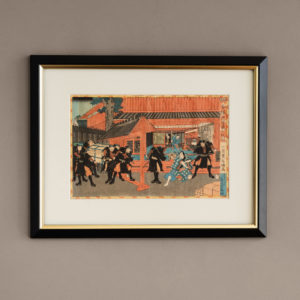
A scene from ’47 Ronin’ a Japanese Samurai Tale, 1852, after Utagawa Fusatane (active 1854-1889)
£350A scene from ’47 Ronin’ a Japanese Samurai Tale, 1852, after Utagawa Fusatane (active 1854-1889)
This print vividly depicts the famous night attack of 47 ronin, or masterless samurai, on the house of Moronao.£350 -
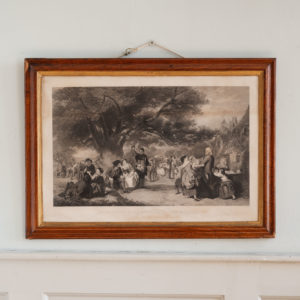
An English Merry-Making in the Olden Time – William Powell Frith
£350An English Merry-Making in the Olden Time – William Powell Frith
An large oak and gilt framed engraving by William Powell Frith showing a village celebration of the mid 17th Century taking place in the shade of a large oak tree.£350 -
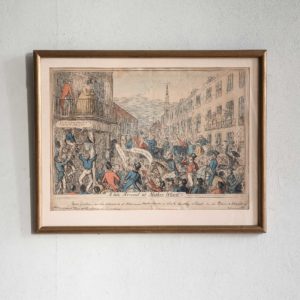
A late Arrival at Mother Wood’s
£350A late Arrival at Mother Wood’s
Hand-coloured etching by George Cruikshank, published by Mr George Humphrey. The scene depicts Caroline of Brunswick, the estranged wife of the newly ascended King George IV, saluting and addressing an adoring crowd from the balcony of Alderman Wood's residence in South Audley Street, London. Alderman Woods was a low-born hop merchant who's investments in a colouring agent for porter had supplied him with the means to further career in Radical politics. He achieved an almost unprecedented two-term mayoralty of the City of London where his opposition to the governments repressive domestic legislation and condemnation of the Peterloo massacre, as well as his perceived upstart vulgarity, made him a hate-figure for Tories and Loyalists. His Whig-Radicalism continued into his term as MP for the City of London and when, in 1820 he saw the chance to embarrass the King and his adherents by the return of his absent and unloved wife, he took it boldly. Woods persuaded Caroline of Brunswick to terminate the discreet ongoing negotiations for a settlement she had been engaged in with the King and instead return, splendidly and publicly, to the capital to assert her claim to be rightful Queen of England. Alderman Woods arranged for Caroline to be conveyed in an open carriage through the heart of London to his house on South Audley Street where she became the unlikely figure-head of Radical Whiggery in the metropolis. The diarist Charles Greville noted of the procession to the house on the 6th of June 1820: "The Queen arrived in London yesterday at seven o’clock… She travelled in an open landau, Alderman Wood sitting by her side and Lady Anne Hamilton and another woman opposite. Everybody was disgusted at the vulgarity of Wood in sitting in the place of honour, while the Duke of Hamilton’s sister was sitting backwards in the carriage". Caroline would spend the next two months at South Audley Street where the the great and the good of British radicalism paid her court amidst the crowds outside South Audley Street.£350 -
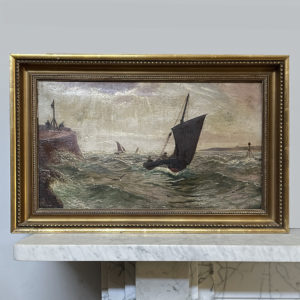
An oil on canvas seascape,
£320An oil on canvas seascape,
depicting a small fishing vessel sailing home between buoy and cliffs, probably a Scottish scene, signed bottom left,£320 -
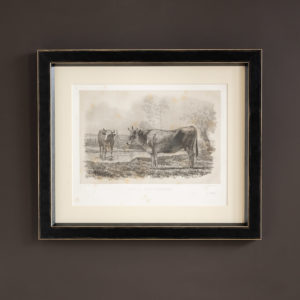
Original lithographs of Cattle Breeds published 1862, ‘Vache Parthenaise’,
£300 eachOriginal lithographs of Cattle Breeds published 1862, ‘Vache Parthenaise’,
Printed by Lemercier of Paris.£300 each -
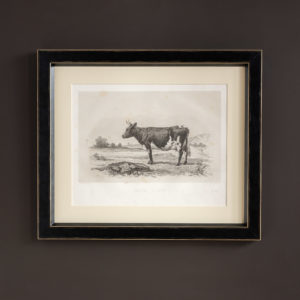
Original lithographs of Cattle Breeds published 1862, ‘Vache D’Ayr’,
£300 eachOriginal lithographs of Cattle Breeds published 1862, ‘Vache D’Ayr’,
Printed by Lemercier of Paris.£300 each -
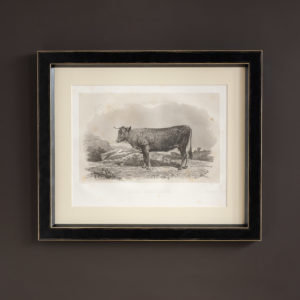
Original lithographs of Cattle Breeds published 1862, ‘Vache Garonnaise’,
£300 eachOriginal lithographs of Cattle Breeds published 1862, ‘Vache Garonnaise’,
Printed by Lemercier of Paris.£300 each -
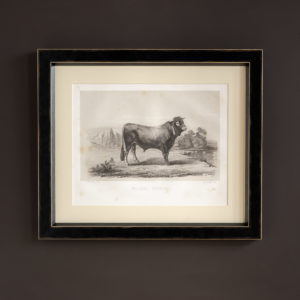
Original lithographs of Cattle Breeds published 1862, ‘Taureau Bazadais’,
£300 eachOriginal lithographs of Cattle Breeds published 1862, ‘Taureau Bazadais’,
Printed by Lemercier of Paris.£300 each -
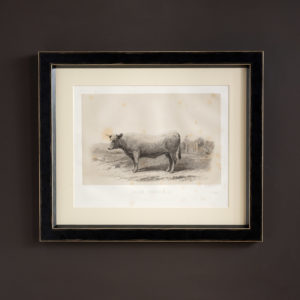
Original lithographs of Cattle Breeds published 1862, ‘Vache Charolaise’,
£300 eachOriginal lithographs of Cattle Breeds published 1862, ‘Vache Charolaise’,
Printed by Lemercier of Paris.£300 each -
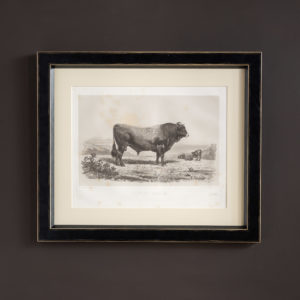
Original lithographs of Cattle Breeds published 1862, ‘Taureau Gascon’,
£300 eachOriginal lithographs of Cattle Breeds published 1862, ‘Taureau Gascon’,
Printed by Lemercier of Paris.£300 each -
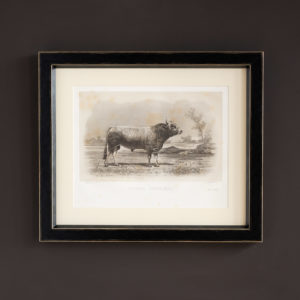
Original lithographs of Cattle Breeds published 1862, ‘Taureau Parthenais’,
£300 eachOriginal lithographs of Cattle Breeds published 1862, ‘Taureau Parthenais’,
Printed by Lemercier of Paris.£300 each -
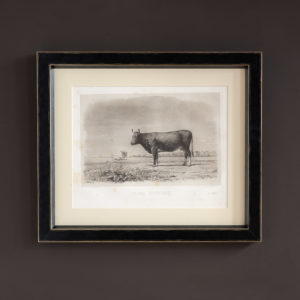
Original lithographs of Cattle Breeds published 1862, ‘Vache Bretonne’,
£300 eachOriginal lithographs of Cattle Breeds published 1862, ‘Vache Bretonne’,
Printed by Lemercier of Paris.£300 each -
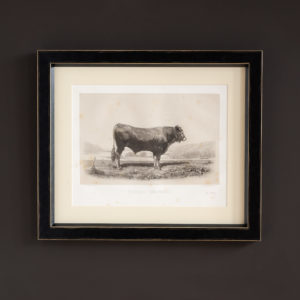
Original lithographs of Cattle Breeds published 1862, ‘Taureau Garonnais’,
£300 eachOriginal lithographs of Cattle Breeds published 1862, ‘Taureau Garonnais’,
Printed by Lemercier of Paris.£300 each -
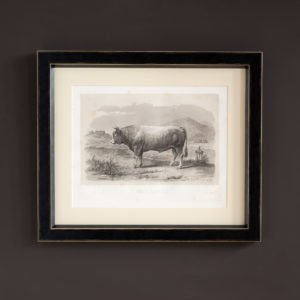
Original lithographs of Cattle Breeds published 1862, ‘Taureau Limousin’,
£300 eachOriginal lithographs of Cattle Breeds published 1862, ‘Taureau Limousin’,
Printed by Lemercier of Paris.£300 each -
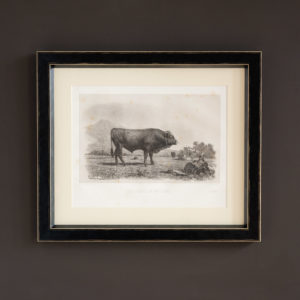
Original lithographs of Cattle Breeds published 1862, ‘Taureau D’Aubrac’,
£300 eachOriginal lithographs of Cattle Breeds published 1862, ‘Taureau D’Aubrac’,
Printed by Lemercier of Paris.£300 each -
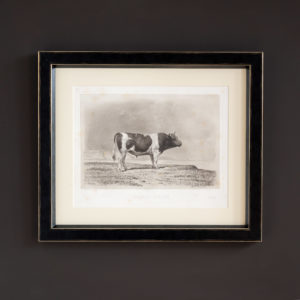
Original lithographs of Cattle Breeds published 1862, ‘Taureau Breton’,
£300 eachOriginal lithographs of Cattle Breeds published 1862, ‘Taureau Breton’,
Printed by Lemercier of Paris.£300 each -
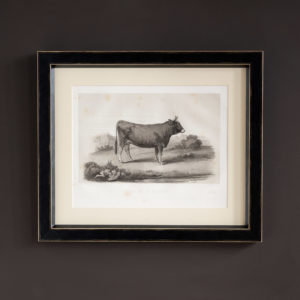
Original lithographs of Cattle Breeds published 1862, ‘Vache D’Aubrac’,
£300 eachOriginal lithographs of Cattle Breeds published 1862, ‘Vache D’Aubrac’,
Printed by Lemercier of Paris.£300 each -
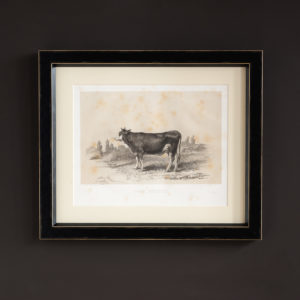
Original lithographs of Cattle Breeds published 1862, ‘Vache Mancelle’,
£300 eachOriginal lithographs of Cattle Breeds published 1862, ‘Vache Mancelle’,
Printed by Lemercier of Paris.£300 each -
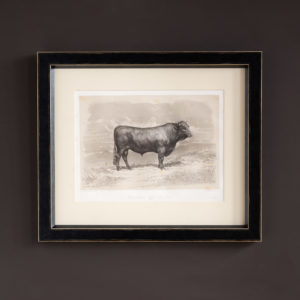
Original lithographs of Cattle Breeds published 1862, ‘Taureau de Salers’,
£300 eachOriginal lithographs of Cattle Breeds published 1862, ‘Taureau de Salers’,
Printed by Lemercier of Paris.£300 each -
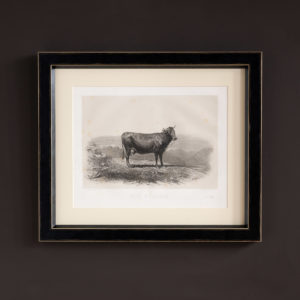
Original lithographs of Cattle Breeds published 1862, ‘Vache D’Oberhasli’,
£300 eachOriginal lithographs of Cattle Breeds published 1862, ‘Vache D’Oberhasli’,
Printed by Lemercier of Paris.£300 each -
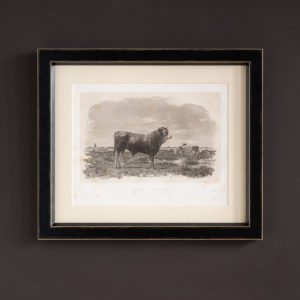
Original lithographs of Cattle Breeds published 1862, ‘Taureau Landais’,
£300 eachOriginal lithographs of Cattle Breeds published 1862, ‘Taureau Landais’,
Printed by Lemercier of Paris.£300 each -
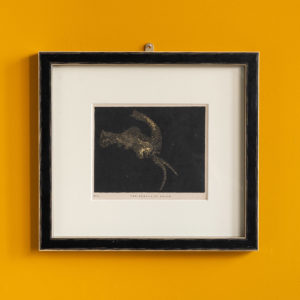
“The Beauty of the Heavens: A Pictorial Display of The Astronomical Phenomena of The Universe” by Charles Blunt, ‘The Nebula of Orion’,
£295 each“The Beauty of the Heavens: A Pictorial Display of The Astronomical Phenomena of The Universe” by Charles Blunt, ‘The Nebula of Orion’,
In the mid-19th century, Home Education had become very popular for the masses and lecturer, Charles Blunt seeing a gap in the market came up with these illustrations. Blunt who specialised in astronomy and natural philosophy, saw the need for a series of ‘accurate yet popular’ plates illustrating the known Universe. These hand-finished aquatints prints were based on Blunt’s own drawings, depicting celestial and astrological subjects.£295 each -
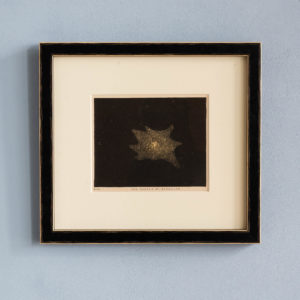
“The Beauty of the Heavens: A Pictorial Display of The Astronomical Phenomena of The Universe” by Charles Blunt, ‘The Nebula of Hercules’,
£295 each“The Beauty of the Heavens: A Pictorial Display of The Astronomical Phenomena of The Universe” by Charles Blunt, ‘The Nebula of Hercules’,
In the mid-19th century, Home Education had become very popular for the masses and lecturer, Charles Blunt seeing a gap in the market came up with these illustrations. Blunt who specialised in astronomy and natural philosophy, saw the need for a series of ‘accurate yet popular’ plates illustrating the known Universe. These hand-finished aquatints prints were based on Blunt’s own drawings, depicting celestial and astrological subjects.£295 each -
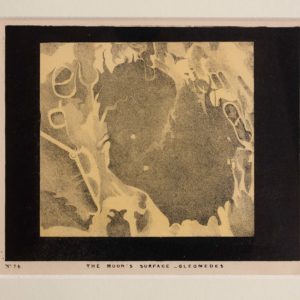
“The Beauty of the Heavens: A Pictorial Display of The Astronomical Phenomena of The Universe” by Charles Blunt, ‘The Moon’s Surface – Cleomedes’,
£295 each“The Beauty of the Heavens: A Pictorial Display of The Astronomical Phenomena of The Universe” by Charles Blunt, ‘The Moon’s Surface – Cleomedes’,
In the mid-19th century, Home Education had become very popular for the masses and lecturer, Charles Blunt seeing a gap in the market came up with these illustrations. Blunt who specialised in astronomy and natural philosophy, saw the need for a series of ‘accurate yet popular’ plates illustrating the known Universe. These hand-finished aquatints prints were based on Blunt’s own drawings, depicting celestial and astrological subjects.£295 each -
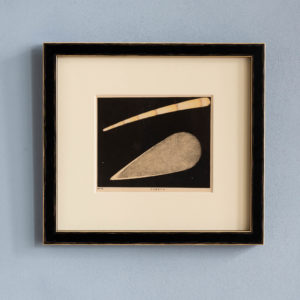
“The Beauty of the Heavens: A Pictorial Display of The Astronomical Phenomena of The Universe” by Charles Blunt, ‘Comets’,
£295 each“The Beauty of the Heavens: A Pictorial Display of The Astronomical Phenomena of The Universe” by Charles Blunt, ‘Comets’,
In the mid-19th century, Home Education had become very popular for the masses and lecturer, Charles Blunt seeing a gap in the market came up with these illustrations. Blunt who specialised in astronomy and natural philosophy, saw the need for a series of ‘accurate yet popular’ plates illustrating the known Universe. These hand-finished aquatints prints were based on Blunt’s own drawings, depicting celestial and astrological subjects.£295 each -
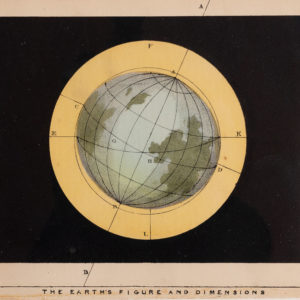
“The Beauty of the Heavens: A Pictorial Display of The Astronomical Phenomena of The Universe” by Charles Blunt, ‘The Earth’s Figure and Dimensions’,
£295 each“The Beauty of the Heavens: A Pictorial Display of The Astronomical Phenomena of The Universe” by Charles Blunt, ‘The Earth’s Figure and Dimensions’,
In the mid-19th century, Home Education had become very popular for the masses and lecturer, Charles Blunt seeing a gap in the market came up with these illustrations. Blunt who specialised in astronomy and natural philosophy, saw the need for a series of ‘accurate yet popular’ plates illustrating the known Universe. These hand-finished aquatints prints were based on Blunt’s own drawings, depicting celestial and astrological subjects.£295 each -
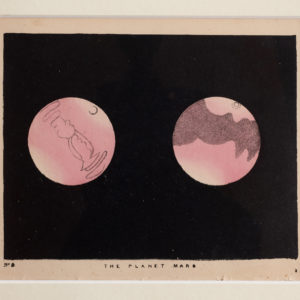
“The Beauty of the Heavens: A Pictorial Display of The Astronomical Phenomena of The Universe” by Charles Blunt, ‘The Planet Mars’,
£295 each“The Beauty of the Heavens: A Pictorial Display of The Astronomical Phenomena of The Universe” by Charles Blunt, ‘The Planet Mars’,
In the mid-19th century, Home Education had become very popular for the masses and lecturer, Charles Blunt seeing a gap in the market came up with these illustrations. Blunt who specialised in astronomy and natural philosophy, saw the need for a series of ‘accurate yet popular’ plates illustrating the known Universe. These hand-finished aquatints prints were based on Blunt’s own drawings, depicting celestial and astrological subjects.£295 each -
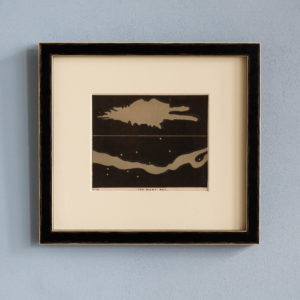
“The Beauty of the Heavens: A Pictorial Display of The Astronomical Phenomena of The Universe” by Charles Blunt, ‘The Milky Way’,
£295 each“The Beauty of the Heavens: A Pictorial Display of The Astronomical Phenomena of The Universe” by Charles Blunt, ‘The Milky Way’,
In the mid-19th century, Home Education had become very popular for the masses and lecturer, Charles Blunt seeing a gap in the market came up with these illustrations. Blunt who specialised in astronomy and natural philosophy, saw the need for a series of ‘accurate yet popular’ plates illustrating the known Universe. These hand-finished aquatints prints were based on Blunt’s own drawings, depicting celestial and astrological subjects.£295 each -
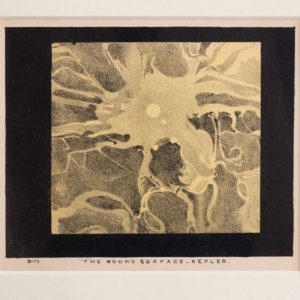
“The Beauty of the Heavens: A Pictorial Display of The Astronomical Phenomena of The Universe” by Charles Blunt, ‘The Moon’s Surface – Kepler’,
£295 each“The Beauty of the Heavens: A Pictorial Display of The Astronomical Phenomena of The Universe” by Charles Blunt, ‘The Moon’s Surface – Kepler’,
In the mid-19th century, Home Education had become very popular for the masses and lecturer, Charles Blunt seeing a gap in the market came up with these illustrations. Blunt who specialised in astronomy and natural philosophy, saw the need for a series of ‘accurate yet popular’ plates illustrating the known Universe. These hand-finished aquatints prints were based on Blunt’s own drawings, depicting celestial and astrological subjects.£295 each -
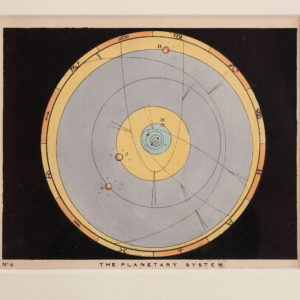
“The Beauty of the Heavens: A Pictorial Display of The Astronomical Phenomena of The Universe” by Charles Blunt, ‘The Planetary System’,
£295 each“The Beauty of the Heavens: A Pictorial Display of The Astronomical Phenomena of The Universe” by Charles Blunt, ‘The Planetary System’,
In the mid-19th century, Home Education had become very popular for the masses and lecturer, Charles Blunt seeing a gap in the market came up with these illustrations. Blunt who specialised in astronomy and natural philosophy, saw the need for a series of ‘accurate yet popular’ plates illustrating the known Universe. These hand-finished aquatints prints were based on Blunt’s own drawings, depicting celestial and astrological subjects.£295 each
Featured Items
-
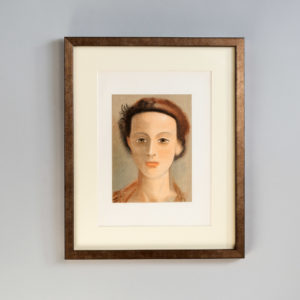
Portrait by Andre Derain, Verve Vol 2 / No. 5-6.
£800Portrait by Andre Derain, Verve Vol 2 / No. 5-6.
The Verve Review was a purposefully luxurious. It ran from 1937 to 1960, but with only 38 editions available, due to the high degree of design and editorial work dedicated to each issue. Each edition contained unique lithographic prints, commissioned by the editor, and each cover a double-page lithograph elaborated by one of the artists contained within. It was the brainchild of its editor Stratis Eleftheriades, a Greek National who moved to Paris in the early thirties to take part in the growing Modernist movement, writing under the name of Teriade.£800 -
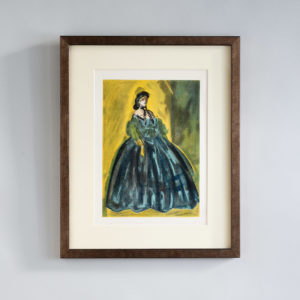
Portraits Part II by Constantin Guys, Verve Vol 2 / No. 5-6.
£500Portraits Part II by Constantin Guys, Verve Vol 2 / No. 5-6.
The Verve Review was a purposefully luxurious. It ran from 1937 to 1960, but with only 38 editions available, due to the high degree of design and editorial work dedicated to each issue. Each edition contained unique lithographic prints, commissioned by the editor, and each cover a double-page lithograph elaborated by one of the artists contained within. It was the brainchild of its editor Stratis Eleftheriades, a Greek National who moved to Paris in the early thirties to take part in the growing Modernist movement, writing under the name of Teriade.£500 -

The Dance, by Henri Matisse, Jan – March 1939 / No. 4.
£1,200The Dance, by Henri Matisse, Jan – March 1939 / No. 4.
The Verve Review was a purposefully luxurious. It ran from 1937 to 1960, but with only 38 editions available, due to the high degree of design and editorial work dedicated to each issue. Each edition contained unique lithographic prints, commissioned by the editor, and each cover a double-page lithograph elaborated by one of the artists contained within. It was the brainchild of its editor Stratis Eleftheriades, a Greek National who moved to Paris in the early thirties to take part in the growing Modernist movement, writing under the name of Teriade.£1,200 -
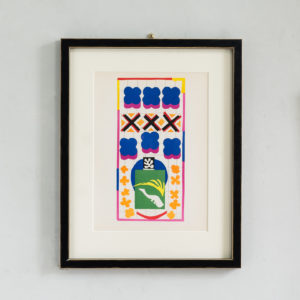
Henri Matisse, ‘The Last Works of Henri Matisse’
£900 eachHenri Matisse, ‘The Last Works of Henri Matisse’
From Verve Vol. IX No. 35/36 published by Tériade under the title 'The Last Works of Henri Matisse'£900 each

